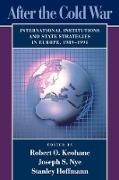Beschreibung
Produktdetails
| Autoren | Robert O. Keohane |
| Mitarbeit | Stanley Hoffmann (Herausgeber), Hoffmann Stanley (Herausgeber), Robert O. Keohane (Herausgeber), Joseph S. Nye (Herausgeber), Joseph S. Jr. Nye (Herausgeber) |
| Verlag | Harvard University Press |
| Sprache | Englisch |
| Produktform | Taschenbuch |
| Erschienen | 30.09.1993 |
| EAN | 9780674008649 |
| ISBN | 978-0-674-00864-9 |
| Seiten | 512 |
| Abmessung | 157 mm x 238 mm x 29 mm |
| Serien |
Center for International Affairs Center for International Affairs |
| Themen |
Schule und Lernen
> Unterrichtsvorbereitung
> Berufliche Bildung
Sozialwissenschaften, Recht,Wirtschaft > Politikwissenschaft > Staatslehre und politische Verwaltung Europe, POLITICAL SCIENCE / International Relations / General, POLITICAL SCIENCE / Public Policy / General, POLITICAL SCIENCE / World / European, EU (European Union), International institutions, Central / national / federal government policies, c 1990 to c 2000, c 1990 to c 1999, C 1980 To C 1990, c 1980 to c 1989, EU & European institutions, Central government policies |
Kundenrezensionen
Zu diesem Artikel wurden noch keine Rezensionen verfasst. Schreibe die erste Bewertung und sei anderen Benutzern bei der Kaufentscheidung behilflich.
Schreibe eine Rezension
Top oder Flop? Schreibe deine eigene Rezension.

